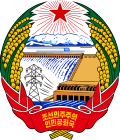Democratic People's Republic of Korea
| Democratic People's Republic of Korea 조선민주주의인민공화국 | |
|---|---|
|
Anthem: 애국가 Aegukka ("The Patriotic Song") | |
 | |
| Capital and largest city |
Pyongyang |
| Official languages | Korean (Munhwaŏ) |
| Official script | Chosŏn'gŭl |
| Mode of production | Capitalism |
| Government |
Unitary Kimilsungist–Kimjongilist republic under a bourgeois military dictatorship |
• General Secretary |
Kim Jong Un |
• Premier |
Pak Thae-song |
The Democratic People's Republic of Korea[a] (DPRK), commonly known as North Korea, is a revisionist state located in East Asia. It borders the People's Republic of China and Russian Federation to its north and the Republic of Korea (or South Korea) to its south.
The DPRK was formed in 1948 in the aftermath of a decades-long occupation by Imperial Japan and national liberation war. The Korean peninsula was divided between the Soviet-aligned North and South, which became a client state for American imperialism. Following the Korean War of 1950 to 1953 and rise of Nikita Khrushchev in the Soviet Union, the leader of the Workers' Party of Korea, Kim Il Sung, would depart from Marxism–Leninism in favor of what would become an ethnonationalist deviation, Juche. This split from Marxism–Leninism was completed by his successors, namely, Kim Jong Il.[1] In the modern era under Kim Jong Un, North Korea has aligned with Chinese and Russian imperialism and undergone a restoration of capitalism.[2][3]
See also
References
- ↑ "The DPRK On Race" (2015).
- ↑ Hyonhee Shin (December 16, 2021). "Private sector overtakes state as North Korea's top economic actor under Kim". Reuters. Retrieved March 30, 2025.
- ↑ Cheong-Hoon Baek, Eun-Young Kim, Keum-Sung Park, Mechanisms of housing marketisation in North Korea, Habitat International, Volume 113, 2021, 102377,ISSN 0197-3975, https://doi.org/10.1016/j.habitatint.2021.102377.
Notes
- ↑ Korean: 조선민주주의인민공화국; Romanized: Chosŏn Minjujuŭi Inmin Konghwaguk.

